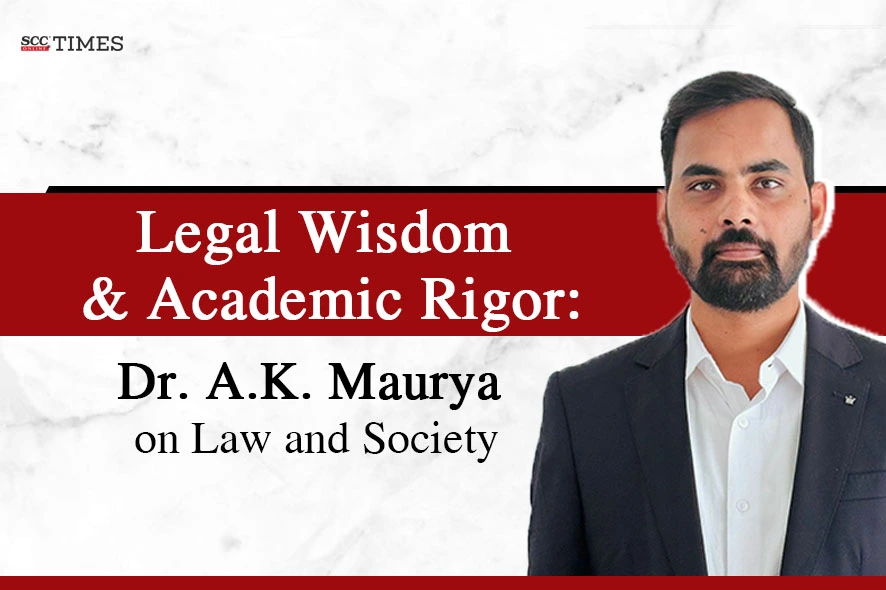“Academic space provides a unique platform to influence both thought and policy, unmatched by other professional avenues.”
1. Kindly introduce yourself to our readers. Could you mention the fundamental reasons that led you to pursue the legal field?
I am Anil Maurya, currently serving as an Associate Professor at the Faculty of Law, Banaras Hindu University. My inclination towards the legal field was shaped early on by my family environment. Belonging to a joint family where many members are involved in the legal profession, I was naturally drawn to it. However, unlike others in my family who pursued legal practice or judicial services, I chose academia. The flexibility, intellectual exposure, and broader outreach that academia offers were compelling reasons behind my decision. I believe that the academic space provides a unique platform to influence both thought and policy, unmatched by other professional avenues.
2. You have been a faculty at the prestigious Banaras Hindu University for 9 years. Could you shed some light on your experience?
Serving at Banaras Hindu University (BHU) has been nothing short of a dream. The University attracts bright and meritorious students from diverse and humble backgrounds, making the teaching experience deeply rewarding. Over the years, the rapport I have developed with students has become a valuable form of social capital. BHU offers excellent infrastructure, including libraries, hospitals, sports facilities, and a serene campus environment. All these elements contribute to a healthy, stress-free atmosphere that fosters academic and personal growth.
3. Having been a Law Clerk-cum-Research Assistant at the Allahabad High Court (Lucknow Bench), what is the significance and benefit of such an engagement?
Judicial clerkship is an invaluable experience for any aspiring legal professional. During my tenure as a Law Clerk-cum-Research Assistant, I gained first-hand insight into court proceedings, judicial reasoning, and procedural intricacies. While earlier this role was not widely recognised, its importance has grown over time. The recent Supreme Court mandate requiring three years of practice to be eligible for the lower judiciary aligns with the principles of experiential learning promoted by judicial clerkships. It bridges the gap between academic knowledge and practical application.
4. You were involved in a project on the study of Family Courts of Lucknow, funded by the Department of Higher Education. Could you briefly explain the key findings and suggestions for better functioning of such courts?
The study, concluded in 2012, recommended the establishment of dedicated Family Courts in every district of the Lucknow division. Our findings highlighted poor female representation in the judiciary, particularly in Family Courts where the law ideally mandates women Judges. We suggested increased recruitment and appointment of women to these roles. Encouragingly, in subsequent years, female representation in the lower judiciary has grown significantly. The study also emphasised the need for infrastructure and training reforms to make Family Courts more accessible and effective.
5. What is the role of co-curricular activities in defining the skill set of a law student? What activities should students pursue during their time in college?
Co-curricular activities are vital for holistic student development. Legal education should not be confined to textbooks or classrooms. Participation in sports, cultural events, and debates nurtures critical thinking, mental well-being and interpersonal skills. A well-rounded personality is essential for any legal professional. These activities not only reduce academic stress but also help students develop leadership qualities, teamwork and empathy — skills that are indispensable in any career.
6. In your opinion, what steps should a law student take to build a career in academia?
Academia is a fulfilling and intellectually stimulating career path. For those aspiring to enter this field, strong writing and speaking skills are essential. Students should actively participate in debates, discussions, and begin writing early — whether through blogs, articles or research papers. Organising oneself with digital tools and setting a clear academic roadmap, including plans for postgraduate and doctoral studies, is equally important. With the emergence of private universities offering competitive packages and the prospect of global institutions establishing centers in India, the academic field holds bright prospects. However, sustained self-improvement and dedication remain the keys to success.
7. How do you think the rapidly growing field of artificial intelligence will shape the Information Technology Act, 2000?
Artificial intelligence will significantly influence not just the Information Technology Act, 2000 (IT Act)3 but also other legal domains like copyright, data protection and liability frameworks. The Government appears cautious and rightly so. Rather than rushing into comprehensive legislation, a phased approach beginning with ethical guidelines and pilot frameworks is preferable. This ex ante model allows for safe artificial intelligence (AI) development and gradual legal adaptation. Amendments to the IT Act could serve as interim measures to regulate the emerging challenges posed by disruptive technologies.
8. You have recently been appointed as a visiting scholar at the University of Vienna. How do you view the importance of such international collaborations in shaping Indian academia?
In an increasingly interconnected world, international collaborations are essential for academic growth. My decision to collaborate with European institutions, particularly the University of Vienna, stems from the European Union’s (EU’s) leadership in legal-technical frameworks. Initiatives like the General Data Protection Regulation (GDPR) and the Artificial Intelligence Act, 2024 (AI Act) have set global benchmarks. Engaging with such advanced legal ecosystems offers valuable insights that can be adapted to Indian contexts. These collaborations help foster comparative research and policy dialogue, enriching both teaching and scholarship.
9. What would be your parting words of advice to young lawyers and law students?
Perseverance is key. Use technology wisely to stay updated and organised. Avoid chasing immediate financial gains; instead, focus on building competence and credibility. Be compassionate toward the underprivileged and strive to be a responsible citizen. In the long run, dedication, empathy, and ethical conduct will define your success and contribution to the nation.
1. Associate Professor, Faculty of Law, Banaras Hindu University.
2. Student Ambassador, Faculty of Law, Banaras Hindu University.


